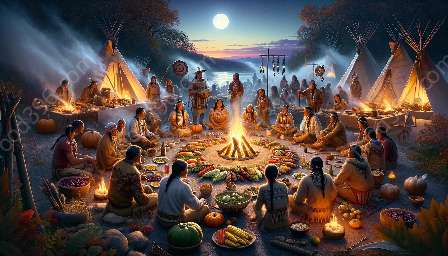Native American foodways are a rich tapestry woven into the historical and cultural fabric of the continent, reflecting the diverse and bountiful landscapes that indigenous peoples have inhabited for millennia. The impact of colonization on Native American foodways has been significant, shaping traditional cuisines and culinary practices in complex and profound ways. To understand this impact, we must delve into the historical context of Native American cuisine and the enduring influence of colonialism on their food traditions.
The Historical Background of Native American Cuisine
The culinary heritage of Native American tribes is deeply rooted in the ancient rhythms of the land, embracing a deep connection to nature and a reverence for the bountiful resources that sustained their communities. For thousands of years, indigenous peoples developed intricate foodways that celebrated the diversity of local flora and fauna, incorporating a wide array of ingredients to craft nourishing and flavorful dishes that reflected their intimate knowledge of the natural world.
Traditional Native American cuisines varied widely across different regions, reflecting the distinct ecosystems and agricultural practices of each tribal community. The cultivation of maize, beans, squash, and other native crops formed the foundation of many indigenous diets, while foraging, hunting, and fishing supplied an abundance of wild game, seafood, and edible plants. The culinary traditions of Native American tribes evolved in harmony with the rhythms of nature, with seasonal feasts, communal cooking, and ceremonial foods playing a central role in their social and spiritual lives.
The Influence of Colonialism on Traditional Foods and Cooking Techniques
The arrival of European colonists reshaped the culinary landscape of North America, sparking a profound transformation in Native American foodways. Colonization brought with it a complex web of forces that fundamentally altered indigenous diets, agricultural practices, and culinary traditions, leaving a lasting imprint on the rich tapestry of Native American cuisines.
One of the most significant impacts of colonization was the introduction of new crops, livestock, and cooking techniques to Native American communities. European settlers brought with them a wide array of foodstuffs, including wheat, rice, sugar, coffee, and various spices, as well as domesticated animals such as cattle, pigs, and chickens. These imported ingredients and livestock not only enriched the indigenous pantry but also led to the integration of new flavors, cooking methods, and culinary practices into traditional Native American cuisines.
Colonialism also exerted profound pressure on Native American land and food systems, disrupting traditional agricultural practices and subsistence economies. The imposition of colonial policies, the encroachment of settlement, and the displacement of indigenous peoples from their ancestral territories resulted in the loss of traditional farming lands, food resources, and hunting grounds. This forced many Native American communities to adapt to new food sources and cultivation methods, leading to a reconfiguration of their dietary patterns and culinary customs.
Furthermore, the introduction of European cooking techniques and culinary technologies exerted a transformative influence on Native American food preparation. Indigenous communities adapted to the use of iron cookware, the adoption of new cooking methods such as frying, baking, and stewing, and the incorporation of European culinary styles into their traditional cooking practices. The fusion of indigenous and colonial culinary traditions gave rise to a vibrant synthesis of flavors and foodways, as Native American cuisines evolved to embrace the diverse influences of both their ancestral heritage and the colonial encounter.
Preservation and Revitalization of Native American Foodways
Despite the profound impacts of colonization on their food traditions, Native American communities have demonstrated remarkable resilience and determination in preserving and revitalizing their culinary heritage. Efforts to reclaim and celebrate traditional foods, cooking techniques, and culinary knowledge have been instrumental in preserving the cultural identity and nutritional well-being of indigenous peoples.
Contemporary initiatives aimed at reclaiming Native American food sovereignty, revitalizing traditional food systems, and promoting culinary education have been pivotal in reclaiming the vitality and authenticity of indigenous cuisines. Indigenous chefs, farmers, and food activists have played a pivotal role in advocating for the revitalization of traditional foodways, championing the use of indigenous ingredients, reviving ancestral cooking methods, and elevating the visibility of Native American cuisines on the global culinary stage.
The resurgence of interest in indigenous food sovereignty and culinary revitalization has sparked a renaissance of Native American cuisine, inspiring a new generation to embrace the legacy of their ancestors and uphold the cultural significance of traditional foods. Through a reclamation of ancestral food knowledge, the preservation of heirloom crops, and the celebration of indigenous culinary traditions, Native American communities have forged a path towards culinary sovereignty, resilience, and cultural pride.
Conclusion
The impact of colonization on Native American foodways has been a complex and multifaceted journey, marked by the convergence of diverse cultural influences, historical transformations, and the enduring legacy of indigenous resilience. From the historical background of Native American cuisine to the profound influence of colonialism on traditional foods and cooking techniques, the culinary legacy of indigenous peoples reflects an enduring tapestry of heritage, adaptation, and cultural revitalization. As we explore the rich and diverse tapestry of Native American foodways, we honor the enduring spirit and cultural resilience of indigenous communities, celebrating their profound connection to the land and the enduring legacy of their culinary traditions.

